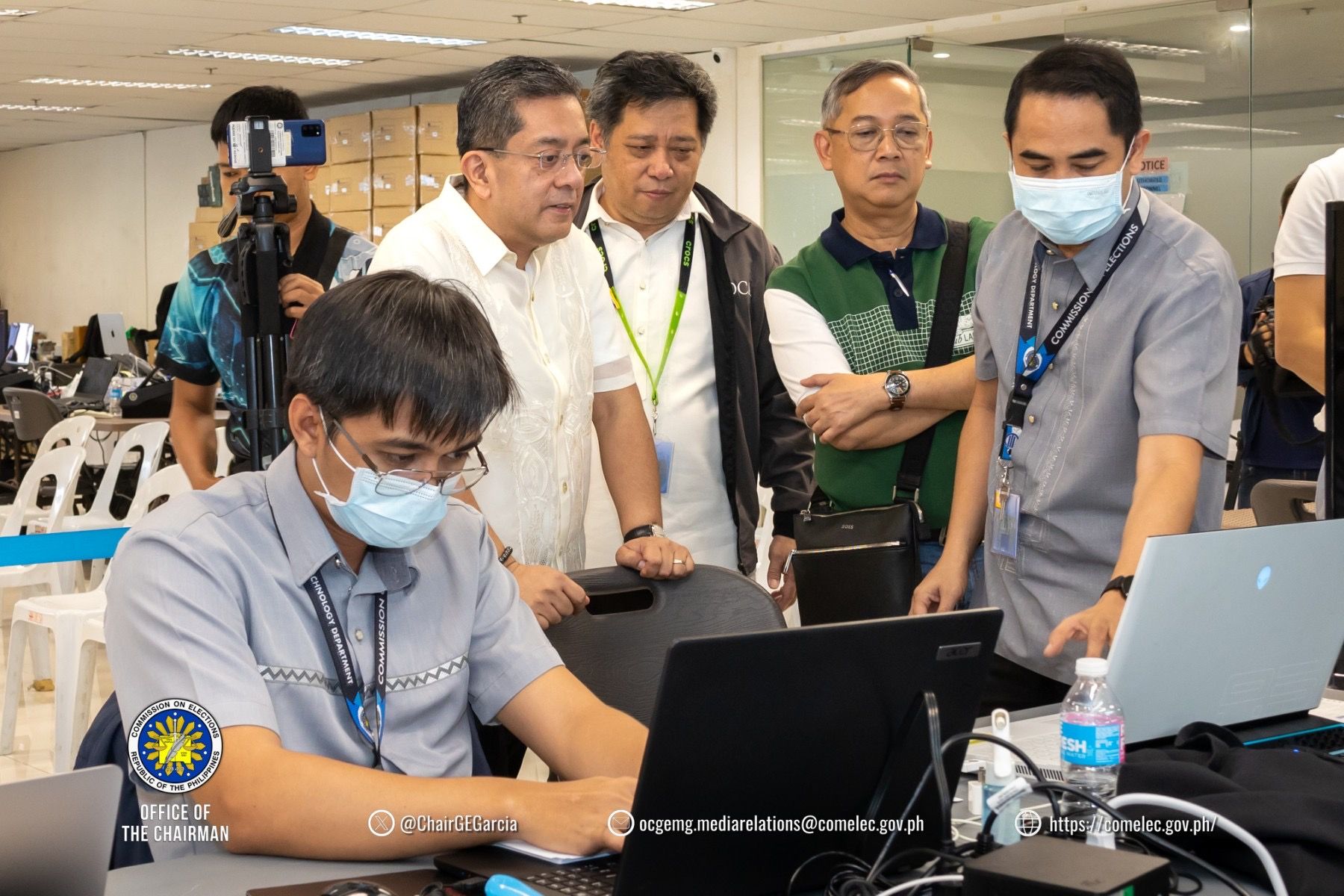Comelec begins acceptance test of 27,000 ACMS, peripherals for 2025 polls
By Dhel Nazario
Over 27,000 Automated Counting Machines (ACMs) of the Commission on Elections (Comelec) are undergoing the process of Hardware Acceptance Test (HAT) including Starlink satellites in its Biñan, Laguna Warehouse as well as the laboratory test of ACMS, and Consolidated Canvassing System (CCS) Laptops at the MIRU office in Binondo, Manila.

Comelec Chairman George Garcia along with Commissioner Noel Celis and other senior officials invited some members of the media to personally witness the conduct of the HAT of the 27,000 ACMs by employees at the Comelec Biñan Warehouse that have so far been delivered by service-provider MIRU, as well as of the Starlink satellites from service-provider iONE which will be used to transmit results in far-flung areas of the country where signal strength is a problem.
During the HAT, the following parts and components of the ACM are tested: battery mode operation, touch screen, scanner, printer, camera, audio, smartcard port, USP ports, LED, sensor, external keypad, network, and HDMI.
Comelec said that the conduct of the HAT is for quality assurance purposes, as the poll body will not formally accept a machine if any of its parts fail the test, and MIRU is under obligation to repair or replace the defective parts or machines.
Further, for every batch of delivery of ACMs, five percent of its total number will undergo a Stress Test wherein 1,000 accomplished ballots are fed to the ACM, reports are generated, and the results are checked for accuracy.
"Kung napansin ninyo, sa bawat area ay may Comelec [Information Technology Department] ITD personnel para siguraduhin na yung ginagawa ng bawat isa ay tama. At the same time, hindi pipirma yung mga tao namin na okay yung delivery na ito, at least sa hardware acceptance, kung may palpak o may problema. Kung napansin niyo nga, kung tutuusin, mahina lang yung audio, reject na, kasi dapat malakas yung audio (If you noticed, every area has Comelec ITD personnel to ensure that everyone's doing is right. At the same time, our people would not approve this delivery, at least in hardware acceptance, if there's a flaw or a problem. If you also noticed, even if the audio is bad, it gets rejected because the audio has to be good)," Garcia said.
"Meaning to say, ganyan katindi yung klase ng quality control na ipinatutupad natin dito. Ang instruction natin sa ating ITD, sa ating [Project Management Office] PMO, we have to adopt the highest quality standard kasi we deserve no less (This means, this is how strict the type of quality control we're employing. Our instruction to the ITD, to our PMO, is we have to adopt the highest quality standard since we deserve no less)," he added.
Initially, 2,000 ACMs are set to undergo HAT as these will be used for Comelec roadshows nationwide beginning November 2024, wherein Filipinos will be given the opportunity to experience first-hand how to properly accomplish a ballot and feed the accomplished ballot to the ACM.
The May 12, 2025 National and Local Elections and the 1st Parliamentary Elections in the Bangsamoro Autonomous Region in Muslim Mindanao (BARMM) will mark the first time that Filipinos will use the all-new ACM, thus it is crucial to ensure that they familiarize themselves with the machine beforehand through these voting experience activities.
"Inuuna nila yung 2,000 [ACM] na gagamitin ng Education and Information Department (EID) para mai-demo sa ating mga kababayan sa buong Pilipinas beginning November, December, up to January 30 [2025]. Kasi nga gusto natin, alam, nahahawakan, nakikita ng kababayan natin yung mga makina para hindi sila nalilito, natatakot na gamitin (They're prioritizing the 2,000 which will be used for EID to conduct a demo for the people in the whole country beginning November, December, up to January 30 [2025]. Because what we want is they know, they can physically touch, and see our machines so they won't get confused or afraid to use them)," Garcia said.
Also undergoing HAT at the Biñan Warehouse are 2,000 out of the 7,000 Starlink satellites committed to be delivered by iONE. Eighty Starlink satellites have completed the HAT as of September 11, 2024.
On the other hand, the Laboratory Test of the ACMs and CCS Laptops at the MIRU office is being conducted to determine if the customization requirements have been complied with. If the ACMs and CCS Laptops fail the acceptance criteria, the service providers who have representatives present at the testing site must review and make the necessary corrections.
Some of the customizations that focus on transparency mechanisms include, among others, the on-screen ballot review and the vote review using the QR code in the voter's receipt.
MIRU is on track to deliver 110,000 ACMs by November this year, or earlier than the target completion date of December 2024.